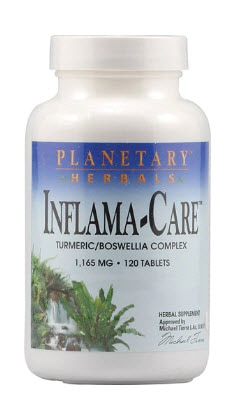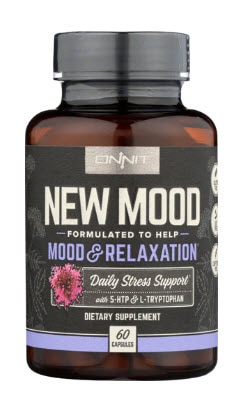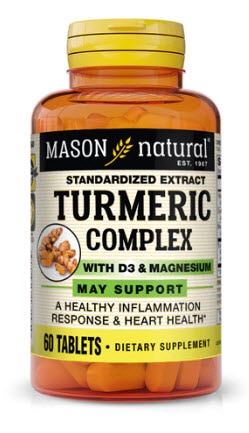Inflammation has gone from a relatively unknown issue to a trending topic, popping up everywhere from IG feeds to food labels. For good cause too: A mounting body of research reveals that chronic inflammation is at the root of several critical conditions, from Alzheimer’s and atherosclerosis to obesity and osteoporosis.
And yet, did you know that inflammation can also impact your mood?
Angst, the blues, irritability, anger—all can be triggered if you suffer from inflammation, an often-silent complication that frequently comes equipped with a host of health issues, so much so Harvard Health calls it a “unifying theory of disease.”
If inexplicable mood swings have become your norm, you, too, may be suffering from this subtle but detrimental ailment.
Let’s dig in.
But, first: What is inflammation, anyway?
Inflammation is the body’s organic response to an injury, toxins, pathogens, and more—indeed, a rather splendid natural reaction that triggers the healing process.
Typically characterized by redness, swelling, and pain, it’s the welt on your foot after a bee sting, or the redness and bruising on your knee from falling. As Harvard Health explains, “Your immune system dispatches an army of white blood cells to surround and protect the area, creating visible redness and swelling. The process works similarly if you have an infection like the flu or pneumonia.” In this context, inflammation is central. “Without it,” Harvard Health writes, “injuries could fester, and simple infections could be deadly.”
This is what’s known as acute inflammation. Once the healing has ended, your body returns to normal homeostasis or balance: That red welt fades and recedes; that bruise yellows and disappears.
With chronic inflammation, however, the battle to shield your body persists. It becomes a systemic response that lasts not just hours and days, like a welt or a bruise, but can go on for several weeks and years.
In turn, you may experience several unsettling symptoms, including lethargy, weight gain or loss, ongoing infections, and digestive issues such as diarrhea, bloating, and constipation.
Further, healthy cells, tissues and organs can become damaged by this prolonged inflammatory effect, leaving you more susceptible to everything from cell death and cancer to autoimmune diseases (like lupus) and, yes, mood issues. In fact, research reveals that roughly one-third of people who have a mood disorder endured a serious infection—and the resultant inflammation—prior to their diagnosis.
Inflammation and mood: The impacts
In 2019, a large Danish study, which was published in the psychiatry journal JAMA, examined over three million people and their connection between infections and autoimmune diseases and mood disorders, ultimately concluding that there was a powerful correlation between inflammation and mood.
Prior to that, a 2017 study published in Frontiers in Neuro Human Science found that excessive inflammation plays a critical role in the pathophysiology of stress-related diseases, which affects your neurochemistry and neurotransmitters—chemical messengers, primarily in the brain and nervous system, that impact everything from pleasure to memory.
Why does chronic inflammation affect mood?
Weight changes, unshakable fatigue, body aches and pains—all symptoms of chronic inflammation—can naturally take a toll on your mood, while also mimicking several symptoms that are synonymous with mental health issues (which, to some degree, begs the question, what came first: the chicken or the egg?) The connection between inflammation and mood, however, goes much deeper.
While more research needs to be conducted to fully grasp the association between inflammation and mood, studies show that an inflammatory immune response activates cytokines—proteins that aid in the inflammatory reaction and promote healing but, over-activated, create changes in the brain’s concentration of neurotransmitters.
Without the modulation of anti-inflammatory cytokines—keep in mind that your immune response hinges on a balance between inflammatory and anti-inflammatory signals—the brain interprets these as stressors, or threats, which contributes to the onset of anxiety and depression. This is compounded by the fact that pro-inflammatory cytokines weaken the synthesis of serotonin—a key neurotransmitter that influences, and potently at that, feelings of well-being, confidence, and stability. (It also affects sleep—and we all know what a lack of sleep can do to our temper.)
What’s more, chronic inflammation of the gut can cause a shift in the intestinal microbiota—the collection of bacteria in your belly, and what’s increasingly referred to as the body’s “second brain”—has been linked to mental health conditions such as depression and anxiety, as well as schizophrenia and autism. This is due in part to the fact that roughly 95% of your serotonin is manufactured in your gut; disturb its production through inflammation, and you may experience despondency, nervousness, trouble sleeping, touchiness and aggression.
Finally, studies indicate that chronic inflammation can result in impulsive thinking and poor decision-making, which, as Psychology Today frames it, “may lead us to respond to the world in a more reactive, impatient manner,” from snapping at our spouse for a towel on the floor to experiencing a sudden bout of road rage. Over time, this can eat away at your joy and contentment, and present in a glum, or exasperated, mood.
How do I know if I have chronic inflammation?
Acute inflammatory responses are usually observable—particularly in, say, wounds to the skin.
Chronic inflammation, however, is much more imperceptible. In addition to the symptoms outlined above, keep an eye out for these signs:
- Chronic fatigue
- Chronic skin rashes
- Chronic phlegm production
- Chronic joint pain and stiffness
- Chronic digestive disturbances like gas and bloating
- Migraines or chronic headaches
- Chronic inflammation can also provoke what’s now being called “inflammaging”—the idea that low-level inflammationmay prematurely age your skin, leading to dryness, fine lines and wrinkles.
To determine if you have chronic inflammation, ask your healthcare provider if you’re a solid candidate for a high-sensitive C-reactive protein test (hsCRP). This relatively inexpensive exam can assess if you have high levels of hsCRP, which can be indicative of chronic inflammation. Just be sure you don’t take the test when you’re experiencing an acute—and thereby natural—inflammatory response to an injury or an illness.
Also, take an honest inventory of your lifestyle. Experts across the board concede that several factors can incite chronic inflammation, including:
- Smoking
- Age
- Obesity
- Low sex hormones, such as testosterone and estrogen
- A nutrient-deficient but highly caloric diet
- Lack of or insufficient exercise
- Excessive levels of stress
- Poor sleep, insomnia, and/or irregular sleep patterns
- Alcohol
- Long-term exposure to pollutants, allergens, and industrial chemicals
Sound familiar?
You’re not alone: Not only are these lifestyle choices and circumstances prevalent, but the National Institutes of Health reports that not only are chronic inflammatory diseases the leading cause of death in the world but also that their prevalence is expected to rise continually over the next 30 years.
The great news? Inflammation—nor the mood changes and increased risk for chronic conditions like diabetes and chronic respiratory illness that can come with it—needn’t be a life sentence. Rather, you can take a number of crucial steps to “tell” your body that the war, so to speak, is over.
How to inhibit—and prevent—chronic inflammation
On top of making crucial—and necessary—lifestyle changes, such as ditching the Marlboros if you smoke, curbing or ceasing your alcohol intake, spotlighting exercise, and maintaining your ideal weight, consider these key alterations:
1. Follow an anti-inflammatory diet
Standard Western Diets, those that include soda, fried foods, baked goods, candy and processed meats, for example, are jam-packed with ingredients that can prompt systemic inflammation, as they’re filled with refined sugar, unhealthy carbohydrates, sodium, trans and saturated fats, and unpronounceable chemicals (just think of the flavoring in, say, a bag of Doritos). What’s more, the typical American diet is linked with weight gain, which in itself is a risk factor for inflammation.
It may initially feel like a dramatic change to cut processed foods out of your diet. And yet, substituting them for whole foods—lean protein, organic fruits and vegetables, nuts and seeds, and whole grains like oatmeal—can make a world of difference in terms of your health and your outlook on life.
Further, weave in foods that actively fight inflammation. These include nuts like walnuts and almonds, berries, oranges, cherries, fatty fish, tomatoes, olive oil, bell peppers and leafy green vegetables such as spinach and collards. Fruits and vegetables, in particular, are rich in antioxidants that can combat free radical damage and dampen inflammation. And if you love dark chocolate and coffee—either together or separate—you’re in luck: Research shows that java, which brims with polyphenols, can safeguards you against inflammation, while dark chocolate (seventy percent or higher) contains flavonoids that bolster the health of your arteries—just one part of the body that’s affected by inflammation.
Avoids foods that can in many people create inflammation such as gluten, dairy, eggs, soy and peanuts. Often these foods are associated with allergy and inflammation in the intestines. It may seem surprising that what may seem like healthy food can actually spur inflammation. This is especially true if you have imbalanced bowel flora leading to leaky gut syndrome and immune reactions to commonly eaten foods. Avoiding these foods can help with an anti-inflammatory diet and decrease inflammation at the gut.
Lastly? Eschew artificial sweeteners—and for good. Not only do artificial sweeteners, such as aspartame, disrupt the delicate balance of bacteria in your belly, but recent research out of Harvard shows that people who consume artificial sweeteners have a higher rate of depression. Even more disturbing? Studies demonstrate that they can be toxic to the brain and change the strength of mood-balancing neurotransmitters.
2. Temper your stress levels
Chronic stress—the sort that weighs on you relentlessly, keeps you up late at night, and erodes your cheerful demeanor—can affect your mood in and of itself while also deepening your risk for inflammation, or stoking the internal fire that’s already occurring.
A few coping mechanisms to try if you feel like you’re perpetually under the gun: Meditation, yoga, lavender-infused baths, psychotherapy, soul-nourishing social outings, massage, acupuncture, a consistent sleep schedule and time in nature. All simple, and yet all proven to calm the nervous system, reduce stress, foster hormone balance and diminish inflammation.
3. Nurture your gut microbiome
As discussed, there’s a direct association between disruption in your tummy’s bacteria, inflammation, and mood.
To that end, think of your gut microbiome as intensely as you would think about your heart health (or, for some, the vibrancy of their hair, skin and nails). Fuel the “good” bacteria in your intestines with probiotic foods like kimchee and sauerkraut, as well as prebiotic foods such as garlic, onions, bananas, apples and artichokes.
Additionally, prioritize your dental health by brushing and flossing regularly and ensuring you receive timely cleanings and check-ups. Why? Your body may be comprised of hundreds of individuals systems, but it operates as a single organism—meaning, your dental health is linked to your gut microbiome. Indeed, a study out of Cornell shows that harmful bacteria in your mouth can make its way into your intestines and negatively alter its fragile ecosystem.
4. Supplement wisely
A handful of vitamins and nutritional supplements can aid in thwarting, or easing, chronic inflammation. Turmeric, for one, organically encourages normal and healthy immune responses; it also naturally supports anti-inflammatory actions.† The same is true for ginger, which, aside from supplements, can be whipped into teas, stir-fries, soups, and more. L-theanine, an amino acid in green tea, also bolsters proper immune responses, while vitamins A, D, and C enrich bodily repair.†
Further, NSAIDs, such as ibuprofen, can provide relief from inflammatory responses, especially arthritic pain. Just be sure to take them only as directed—and only for a short time—as they can ultimately instigate inflammation too. At the same time, beware of long-term use of antibiotics. These, too, can provoke inflammation and, thus, further sway your temperament.
5. Call upon essential oils
Essential oils have stolen the scene in the world of holistic health, thanks to their capacity to naturally support everything from enhanced energy to sounder sleep. Several essential oils in particular have also been shown to aid in inflammation. Your top options include citrus, lavender, myrrh, and hyssop oils. One to try? Now’s Hyssop Oil. The product, composed of 100% hyssop, has a fragrant camphor scent and both clarifies and refreshes—two things that can do wonders for your mood. Which, let’s face it, sets the entire tone for your life.
†These statements have not been approved by the Food and Drug Administration. These products are not intended to diagnose, treat, cure or prevent disease.




